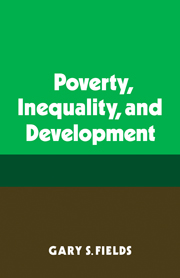Book contents
- Frontmatter
- Contents
- Preface
- 1 Introduction: a new approach to poverty, inequality, and development
- 2 Approaches to income distribution and development
- 3 Growth and distribution: a welfare economic analysis
- 4 Inequality and development
- 5 Absolute income, absolute poverty, and development
- 6 Development progress and growth strategies: case studies
- 7 Development progress and growth strategies: conclusions
- Notes
- Bibliography
- Index
5 - Absolute income, absolute poverty, and development
Published online by Cambridge University Press: 07 October 2009
- Frontmatter
- Contents
- Preface
- 1 Introduction: a new approach to poverty, inequality, and development
- 2 Approaches to income distribution and development
- 3 Growth and distribution: a welfare economic analysis
- 4 Inequality and development
- 5 Absolute income, absolute poverty, and development
- 6 Development progress and growth strategies: case studies
- 7 Development progress and growth strategies: conclusions
- Notes
- Bibliography
- Index
Summary
In this chapter, distributional aspects of development are studied in absolute terms. The first section examines absolute incomes and their correlates and introduces earnings functions. This discussion is followed in the next section by an analysis of the question, How segmented are LDC labor markets? The third section addresses absolute poverty, including various definitions of absolute poverty, counts of the numbers of people failing to attain basic standards of living, and profiles of poverty populations. The chapter continues in the fourth section with a review of the evidence on changing absolute income and poverty in the course of economic development. Conclusions are in the last section.
Absolute incomes and earnings functions
With the rising concern for income distribution in less-developed countries, it is incumbent upon students of economic development to gain a clear understanding of the determinants of incomes at the individual and household levels. Studies decomposing income inequality were reviewed in Chapter 4. Those studies demonstrate that in the countries for which we have information, variations in labor income account for a larger fraction of total income inequality than do variations in all other income sources combined. This is partly because labor's functional share is higher than any other, partly because, for most individuals and families in LDCs, labor is the predominant if not sole income source. Both total income and labor income are in turn associated with economically relevant characteristics of individuals and of their jobs.
- Type
- Chapter
- Information
- Poverty, Inequality, and Development , pp. 125 - 180Publisher: Cambridge University PressPrint publication year: 1980



